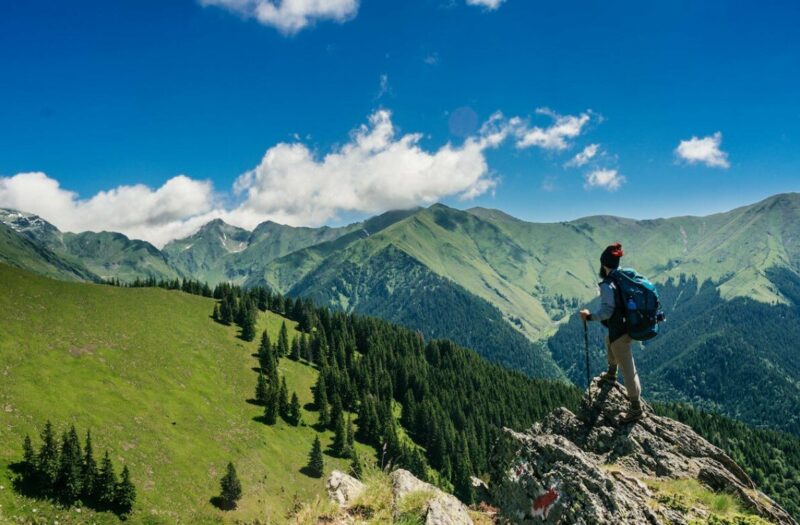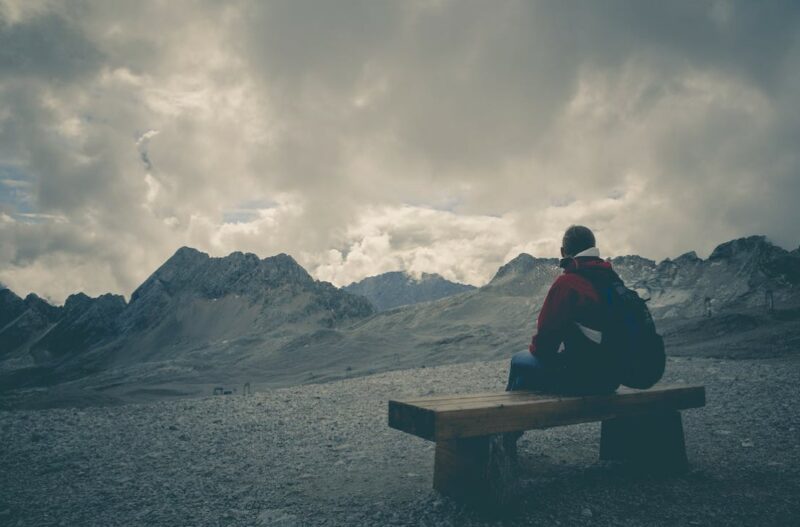Traveling alone can be an intimidating experience, especially if it’s your first time. You must look out for yourself, take care of your belongings, and consider your own safety above all.
While traveling alone isn’t necessarily unsafe, peace of mind comes with having a traveling companion by your side that has your back. But solo travel does have a lot of rewarding factors, hence before you embark on it, preparing for a solo trip with safety precautions and measures can enable a great trip with a peace of mind.

What are the benefits of traveling alone?
Traveling alone can be one of the most remarkable experiences. One of the reasons why solo travel is so great is that all the choices on the itinerary fall into your hands. Solo travelers have the freedom of picking their overnight stay location, food items, and all locations to visit, making it a perfect time to prioritize themselves.
Solo travelers can even experience confidence boosts and self-actualization. Traveling alone means making your own decisions, discovering your passions, and overcoming obstacles on your own. For the introvert or people-pleaser, traveling alone can make you branch out of your comfort zone and lead to self-development.
What should I do to stay safe abroad?
The following tips from measures taken at home, at your destination, and during travel will decrease your likelihood of encountering life-threatening situations.
Some measures to remain safe include researching social norms in the country, carrying safety items, and planning the safest transportation options.
1. Research and precautions
The last thing you want to do is venture into dangerous territories or fall into the hands of untrustworthy or ill-intended locals or travelers. Before departure, research the area’s location, currency, and lifestyle. Also, make it a priority to arrive while there is still daylight.
Researching Health Risks
You’ll also want to look into the potential health risks in your destination country. Check the vaccination requirements and ensure you are protected from illnesses not prevalent in your native country.
The Center for Disease Control (CDC) recommends that individuals be vaccinated 10 days prior to travel to ensure that they are protected while overseas. Countries such as the Philippines urge their visitors to be vaccinated against Japanese encephalitis and cholera.
Other tourist booming locations such as the Amazon have a significant amount of visitors leaving with leprosy and hepatitis. Getting vaccinated prior to travel will eliminate your chance of contracting one of these diseases.
It is also important to note that a tuberculosis vaccine has shown to decrease the likelihood of contracting leprosy as there is no current vaccine for the illness offered. Speak with a medical professional prior to travel to ensure you are covered.
Viruses such as Zika and Dengue cannot be vaccinated against; therefore, travelers should keep their bodies covered to avoid bug bites.
Avoid carrying original documents
Losing original documents can be a hassle, from replacing them to worrying whose hands they could be in. Try limiting yourself to only carrying copies or mobile scans of documents.
iPhone users have the luck of having a scanner pre-built into their phone! By accessing the notes app, iPhone users can scan their documents and carry them on their mobile phone.
Android users can take advantage of the Google Drive app and click scan under the menu options.
Both options allow users to store their scans online and enable access on all devices with access to WiFi. iPhone users, be sure to allow your notes app to sync to iCloud that way you can access your account from any device!
But, keep in mind that not all public Wi-Fi networks are safe. Avoid using them if you do not have a VPN as hackers may be able to access your information.
2. Live Sharing and Social Media
Solo travelers should avoid using live sharing and location sharing on social media platforms when abroad. Social media puts us all in the public eye, and studies have shown that those who share their location online are more prone to life-threatening situations.
By posting about a vacation on social media, social media stalkers/users will know where you are, how far you are from home, and who you are with. To ensure that you or your empty home aren’t targeted abroad, avoid posting while on vacation.
If you do have to use your device for social media or general internet access during your travels, make sure you stay extra protected by using apps like Surfshark antivirus on your phones. Apps like these can keep you and your device safer from hackers using malicious ways to collect your sensitive data while you are abroad and browsing on public wifi.
Before leaving your destination country, purchase suitable travel insurance to ensure you’re covered abroad. Most travel insurance companies require that you invest in insurance before departure, so this is a good thing to get done in advance.
Travel insurance companies allow their clients to set the coverage duration, which travelers can set for as little as a few days to a few months. Some countries, such as Costa Rica, require that travel insurance is purchased for all tourists entering the country and check for this at customs.
When traveling to locations, such as Nepal, some travel insurance companies may not cover you at the altitude you’re in. Meaning that any travelers entering high altitudes need to purchase special travel insurance.
It is important to note that some countries continue to maintain COVID-19 entry requirements while others do not. Check the entry requirements of your destination country to ensure that you have all the necessary documents for entry.
4. Safety Devices and Items
Safety items such as pepper spray and keychain alarms can be a great investment when traveling alone.
Keychain alarms adhere to all TSA guidelines and can be carried on a lanyard for easy access. These alarms are extremely loud and ring when detached with a tug.
Pepper spray can be transported in a checked bag as long as the content is 4 ounces or less. Pepper spray is great for keeping yourself safe from a distance.
Other great safety precautions include RFID wallets and theft-proof bags. These types of items prevent thieves from walking by and scanning your wallet and are also slash-proof.
5. Plan out your commuting in advance
Arriving in a country where you don’t know the native language or traffic rules can be overwhelming: research different transportation methods and which are the safest options. Sometimes rental cars are a great option, but you’ll have to research if you have the necessary driving permits and if it is a right-hand or left-hand drive

Taxis and Ride hailing Cars
Taxis can be great options in the event of flight delays. They’re readily available at all hours of the day and can get you directly to your destination. The only downfall to taxis is that they can be a bit more costly; however, opting for a taxi on your day of arrival is usually the best option.
Hailing apps are also great options for getting from one point to another. Popular apps for hailing a car are Uber, Lyft, and Gett. Hailing apps allow the user to call upon a driver to take them to their destination. The main difference between a taxi and a hailing app is that everything is done online with the hailing app, from booking the ride to paying.
Public Buses or Coaches
Public buses or coaches can also be great options in continents such as Asia and Europe. Foreign transportation options are typically heavily populated and affordable. Buses are perfect for travelers on a budget who want to blend in with local crowds. The only downside is that buses aren’t readily available like a taxi at the snap of a finger.
Many free online resources provide train, bus, ferry, and flight paths with different routes that accommodate all types of travelers. These routes will get you from one point to another while figuring out the best form of transportation. You can also get to know the locals and get information from hostels on some of the best ways to go about the city.
When riding public transportation, travelers should always be aware of their surroundings and keep an eye on their belongings. Public transportation is known to have pickpockets and snatch thieves, simply keep an eye out and avoid leaving your items unattended.
Hitch-hiking
Hitch-hiking can be great to culturally immerse yourself into the local culture; however, there are certain countries where this should be avoided.
Hitchhiking should be avoided in areas such as Syria, Libya, Mozambique, and Nigeria. African and Middle-Eastern countries are classified to be an overall risk for travel and tend to not be hitchhiker friendly.
Some hitchhiking-friendly countries include New Zealand, Romania, Germany, and Belgium. While these countries are listed as safe, travelers should always dress appropriately, send their driver’s license number to a friend, and clarify their route to their destination.
6. Utilize useful Maps and Apps
Having multiple resources for mapping out routes can benefit you when your phone loses service or in countries where different mapping apps are used.
While getting familiar with a map may sound antiquated, knowing how to read a map can be a lifesaver. You don’t even have to know directional terms to read a map.
All you need to do is get to know where local landmarks are and their general direction. If you lose your phone or get into a reception-less area, having a map on hand can help you get back to recognizable territories.
Different countries rely on different mapping platforms as their main system. Countries that don’t commonly use addresses such as Costa Rica, heavily rely on Waze as their main source. Other countries such as Japan, heavily rely on Japan Travel by NAVITIME and Google Maps.
Check your destination country’s main web mapping platform to be sure that you can get the best directions.
7. Share your itinerary with someone at home
Make sure someone in your native country knows about your travel plans, exact itinerary, and time of return. You should also make it a priority to check in with someone every day you travel.
While reporting to someone may sound childish, not checking in leaves uncertainty in the air. If you do go missing, the person will know within 24 hours of your disappearance.
8. Learn basic words
Luckily, many touristy areas have many English speakers; however, learning the native language will help you remain safe in the country if you travel to the countryside or an unpopular tourist location.
The ability to communicate extends beyond safety in other aspects as well. You’ll be able to immerse yourself in a culturally rich experience and grow a love for more than just the popular landmarks.
Knowing the basics should be enough, learn how to greet others, order food, and basic transportation vocabulary.
9. Avoid nights out alone

When traveling alone, it is best to avoid nightlife as it comes with potential risks. Some areas are safe and have great nightlife activities, while others can be questionable. It falls on you to do your research.
If you don’t know about the nightlife in your travel area, avoid going out at night as some countries have high crime rates. Nightlife leaves many openings for criminals to rob you or take advantage of the fact that you are a solo traveler in a foreign land.
Avoid telling others that you are traveling solo. Instead, tell the locals you are traveling and meeting a friend within the region. Eliminating the factor of traveling alone guarantees your safety and decreases the likelihood of you being targeted.
10. Avoid drawing attention through your dressing
Blending in can be one of the best things you can do to disguise yourself as a local. While your native tongue may give you away, dressing as out of the ordinary can secure your safety.
Many countries have social norms that are foreign to your native country. For example, many middle eastern countries frown upon women wearing shorts or revealing clothing. Blending in and avoiding clothing considered “scandalous” can save you from unwanted attention.
Conclusion
Traveling, in general, is never a 100% safe experience. From different languages to cultural norms, staying safe is always up in the air when entering foreign land; however, the list of risks could never overpower a great experience. Don’t let the dangers and fear hold you back.

No Comments